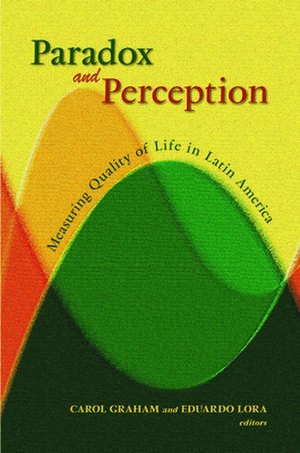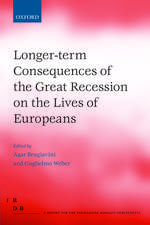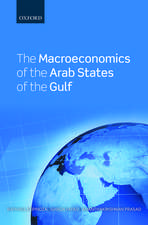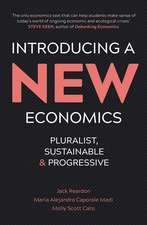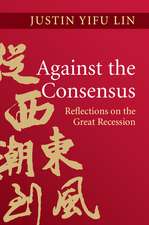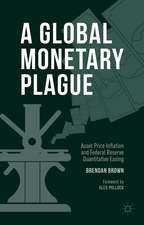Paradox and Perception: Measuring Quality of Life in Latin America
Editat de Carol L. Graham, Eduardo Loraen Limba Engleză Paperback – 29 sep 2009
The "quality of life" concept of quality of life is a broad one. It incorporates basic needs but also extends beyond them to include capabilities, the "livability" of the environment, and life appreciation and happiness. Latin America's diversity in culture and levels of development provide a laboratory for studying how quality of life varies with a number of objective and subjective measures. These measures range from income levels to job insecurity and satisfaction, to schooling attainment and satisfaction, to measured and self-assessed health, among others.
Paradox and Perception greatly improves our understanding of the determinants of well-being in Latin America based on a broad "quality of life" concept that challenges some standard assumptions in economics, including those about the relationship between happiness and income.
The authors' analysis builds upon a number of new approaches in economics, particularly those related to the study of happiness and finds a number of paradoxes as the region's respondents evaluate their well-being. These include the paradox of unhappy growth at the macroeconomic level, happy peasants and frustrated achievers at the microlevel, and surprisingly high levels of satisfaction with public services among the region's poorest. They also have important substantive links with several of the region's realities, such as high levels of income inequality, volatile macroeconomic performance, and low expectations of public institutions and faith in the capacity of the state to deliver. Identifying these perceptions, paradoxes, and their causes will contribute to the crafting of better public policies, as well as to our understanding of why "populist" politics still pervade in much of the region.
Paradox and Perception greatly improves our understanding of the determinants of well-being in Latin America based on a broad "quality of life" concept that challenges some standard assumptions in economics, including those about the relationship between happiness and income.
The authors' analysis builds upon a number of new approaches in economics, particularly those related to the study of happiness and finds a number of paradoxes as the region's respondents evaluate their well-being. These include the paradox of unhappy growth at the macroeconomic level, happy peasants and frustrated achievers at the microlevel, and surprisingly high levels of satisfaction with public services among the region's poorest. They also have important substantive links with several of the region's realities, such as high levels of income inequality, volatile macroeconomic performance, and low expectations of public institutions and faith in the capacity of the state to deliver. Identifying these perceptions, paradoxes, and their causes will contribute to the crafting of better public policies, as well as to our understanding of why "populist" politics still pervade in much of the region.
Preț: 267.26 lei
Nou
Puncte Express: 401
Preț estimativ în valută:
51.14€ • 53.55$ • 42.42£
51.14€ • 53.55$ • 42.42£
Carte tipărită la comandă
Livrare economică 09-23 aprilie
Preluare comenzi: 021 569.72.76
Specificații
ISBN-13: 9780815703266
ISBN-10: 0815703260
Pagini: 258
Dimensiuni: 152 x 229 x 23 mm
Greutate: 0.39 kg
Editura: Brookings Institution Press
Colecția Brookings Institution Press
ISBN-10: 0815703260
Pagini: 258
Dimensiuni: 152 x 229 x 23 mm
Greutate: 0.39 kg
Editura: Brookings Institution Press
Colecția Brookings Institution Press
Notă biografică
Carol Graham is senior fellow and Charles Robinson Chair at the Brookings Institution and College Park Professor at the University of Maryland. She has also served as a special adviser to the executive vice president of the Inter-American Development Bank (IDB).
Eduardo Lora is general manager of the Research Department and chief economist at the IDB. He has been the executive director of Fedesarrollo, in Bogotá, Colombia.
Eduardo Lora is general manager of the Research Department and chief economist at the IDB. He has been the executive director of Fedesarrollo, in Bogotá, Colombia.
Descriere
The "quality of life" concept of quality of life is a broad one. It incorporates basic needs but also extends beyond them to include capabilities, the "livability" of the environment, and life appreciation and happiness. Latin America's diversity in culture and levels of development provide a laboratory for studying how quality of life varies with a number of objective and subjective measures. These measures range from income levels to job insecurity and satisfaction, to schooling attainment and satisfaction, to measured and self-assessed health, among others.
Paradox and Perception greatly improves our understanding of the determinants of well-being in Latin America based on a broad "quality of life" concept that challenges some standard assumptions in economics, including those about the relationship between happiness and income.
The authors' analysis builds upon a number of new approaches in economics, particularly those related to the study of happiness and finds a number of paradoxes as the region's respondents evaluate their well-being. These include the paradox of unhappy growth at the macroeconomic level, happy peasants and frustrated achievers at the microlevel, and surprisingly high levels of satisfaction with public services among the region's poorest. They also have important substantive links with several of the region's realities, such as high levels of income inequality, volatile macroeconomic performance, and low expectations of public institutions and faith in the capacity of the state to deliver. Identifying these perceptions, paradoxes, and their causes will contribute to the crafting of better public policies, as well as to our understanding of why "populist" politics still pervade in much of the region.
Paradox and Perception greatly improves our understanding of the determinants of well-being in Latin America based on a broad "quality of life" concept that challenges some standard assumptions in economics, including those about the relationship between happiness and income.
The authors' analysis builds upon a number of new approaches in economics, particularly those related to the study of happiness and finds a number of paradoxes as the region's respondents evaluate their well-being. These include the paradox of unhappy growth at the macroeconomic level, happy peasants and frustrated achievers at the microlevel, and surprisingly high levels of satisfaction with public services among the region's poorest. They also have important substantive links with several of the region's realities, such as high levels of income inequality, volatile macroeconomic performance, and low expectations of public institutions and faith in the capacity of the state to deliver. Identifying these perceptions, paradoxes, and their causes will contribute to the crafting of better public policies, as well as to our understanding of why "populist" politics still pervade in much of the region.
